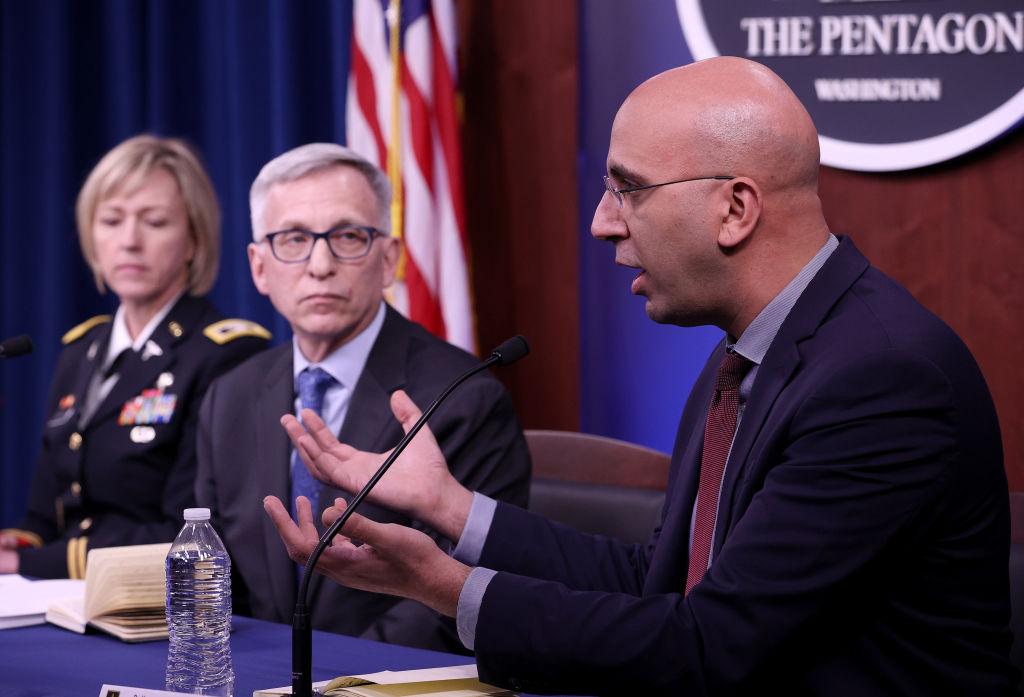Walter Reed military scientists testing vaccine that could protect against Omicron, future COVID variants


A free daily email with the biggest news stories of the day – and the best features from TheWeek.com
You are now subscribed
Your newsletter sign-up was successful
Scientists at the Walter Reed Army Institute of Research spent nearly two years developing a COVID-19 vaccine that should protect people against the new Omicron variant, plus all past SARS-origin viruses, and presumably future coronavirus strains as well, Defense One reports. The Spike Ferritin Nanoparticle (SpFN) vaccine showed promising results in animal trials and Phase 1 human trials that wrapped up this month; it still needs to undergo Phase 2 and Phase 3 human trials.
"We decided to take a look at the long game rather than just only focusing on the original emergence of SARS, and instead understand that viruses mutate, there will be variants that emerge, future viruses that may emerge in terms of new species," Dr. Kayvon Modjarrad, director of Walter Reed's infectious diseases branch, told Defense One. "Our platform and approach will equip people to be prepared for that."
Unlike other vaccines, Defense One reports, "Walter Reed's SpFN uses a soccer ball-shaped protein with 24 faces for its vaccine, which allows scientists to attach the spikes of multiple coronavirus strains on different faces of the protein."
The Week
Escape your echo chamber. Get the facts behind the news, plus analysis from multiple perspectives.

Sign up for The Week's Free Newsletters
From our morning news briefing to a weekly Good News Newsletter, get the best of The Week delivered directly to your inbox.
From our morning news briefing to a weekly Good News Newsletter, get the best of The Week delivered directly to your inbox.
The Phase 1 trials took longer than expected because it was hard to find subjects who had neither been infected with the coronavirus or inoculated against it, Modjarrad said. The next trials will look at how the vaccine interacts with people who were inoculated with a different vaccine or recovered from a COVID-19 infection. "With Omicron, there's no way really to escape this virus," he said. "You're not going to be able to avoid it. So I think pretty soon either the whole world will be vaccinated or have been infected." Read more about the vaccine at Defense One.
A free daily email with the biggest news stories of the day – and the best features from TheWeek.com
Peter has worked as a news and culture writer and editor at The Week since the site's launch in 2008. He covers politics, world affairs, religion and cultural currents. His journalism career began as a copy editor at a financial newswire and has included editorial positions at The New York Times Magazine, Facts on File, and Oregon State University.
-
 Bonfire of the Murdochs: an ‘utterly gripping’ book
Bonfire of the Murdochs: an ‘utterly gripping’ bookThe Week Recommends Gabriel Sherman examines Rupert Murdoch’s ‘war of succession’ over his media empire
-
 Gwen John: Strange Beauties – a ‘superb’ retrospective
Gwen John: Strange Beauties – a ‘superb’ retrospectiveThe Week Recommends ‘Daunting’ show at the National Museum Cardiff plunges viewers into the Welsh artist’s ‘spiritual, austere existence’
-
 Should the EU and UK join Trump’s board of peace?
Should the EU and UK join Trump’s board of peace?Today's Big Question After rushing to praise the initiative European leaders are now alarmed
-
 Trump HHS slashes advised child vaccinations
Trump HHS slashes advised child vaccinationsSpeed Read In a widely condemned move, the CDC will now recommend that children get vaccinated against 11 communicable diseases, not 17
-
 A fentanyl vaccine may be on the horizon
A fentanyl vaccine may be on the horizonUnder the radar Taking a serious jab at the opioid epidemic
-
 Health: Will Kennedy dismantle U.S. immunization policy?
Health: Will Kennedy dismantle U.S. immunization policy?Feature ‘America’s vaccine playbook is being rewritten by people who don’t believe in them’
-
 How dangerous is the ‘K’ strain super-flu?
How dangerous is the ‘K’ strain super-flu?The Explainer Surge in cases of new variant H3N2 flu in UK and around the world
-
 Vaccine critic quietly named CDC’s No. 2 official
Vaccine critic quietly named CDC’s No. 2 officialSpeed Read Dr. Ralph Abraham joins another prominent vaccine critic, HHS Secretary Robert F. Kennedy Jr.
-
 This flu season could be worse than usual
This flu season could be worse than usualIn the spotlight A new subvariant is infecting several countries
-
 FDA OKs generic abortion pill, riling the right
FDA OKs generic abortion pill, riling the rightSpeed Read The drug in question is a generic version of mifepristone, used to carry out two-thirds of US abortions
-
 Why are autism rates increasing?
Why are autism rates increasing?The Explainer Medical experts condemn Trump administration’s claim that paracetamol during pregnancy is linked to rising rates of neurodevelopmental disorder in US and UK
